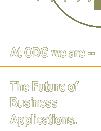 |
 |
Q:
Why use Omnis?
Omnis is a rapid application development environment that is ideally suited
for prototyping, developing and deploying business software solutions.
Applications developed with Omnis can be deployed on Unix, Linux, Windows
and Macintosh operating systems concurrently. Code developed for one platform
is identical for other platforms. Omnis uses a highly optimized tokenization
mechanism that precludes the need for code compilation. This protects
the user's investment in software development by extending the functional
life of the applications and minimizes the dependence on one operating
platform.
Omnis provides native Data Access Modules (DAMs) for many common SQL database
engines as well as an ODBC module. This allows Omnis to act as an intelligent
front end to powerful databases such as Oracle, Sybase, Informix, DB2,
Frontbase and MS SQLServer.
Omnis' graphical approach to the design of windows and reports and its
flexible built-in scripting language and dot notation allow for rapid
development of custom applications that meet the needs of many varied
businesses.
The Omnis software technology has a twenty-year track record. Over the
years, each new version has allowed software developers access to new
user interface capabilities. From headed list boxes and icon arrays to
popup menus and intelligent data entry fields, Omnis has always provided
the means for implementing a modern graphical user interface for accessing
data.
The current version, Omnis Studio 3.1, closely follows object oriented
programming rules and allows for inclusion of ActiveX and Java Beans as
components of the application. This latest version allows developers a
much higher level of code reuse and can dramatically cut development time
for many projects.
Q: I'm not familiar with Omnis.
Is it safe to use it for my business?
Absolutely! Omnis is probably the best-kept secret in the development
world. Many programming languages have come and gone in the last 20 years.
Pascal, C, C++, Visual Basic, dbase, Delphi, PowerBuilder were once each
the "hot" language to use. While every language has its advantages,
they each have many limitations as well. For example, how easy is it to
port an application from Pascal to Visual Basic? When an application is
compiled for one operating system, it can behave adversely when a new
version of the OS is introduced. For example, businesses are now faced
with the issue of rewriting Windows 98 code to run properly with Windows
2000 and XP.
Omnis bypasses these problems by using a highly optimized runtime engine
and a special tokenized language. All that needs to change for a new OS
is the runtime, and Omnis has had a great track record for keeping up
with new OS releases. This approach works so well, that the exact same
Omnis library can be run on Windows 3.1, Window 95/98, Window NT/2000,
Unix, Linux, Macintosh 68K, Power Macintosh and Mac OS X all at the same
time. Any application written in an earlier version of can be converted
up to the latest version and deployed on the newest platforms with only
minor tweaking.
Another advantage is that all the objects and code can be "extracted"
from an Omnis library and saved as text files. So, if you later decide
you really want to port to C++, you can do so.
Q: Omnis is not an " industry standard"
so why should I use it with my SQL database.
Actually, Omnis is more standard than many supposedly standard development
tools. Virtually every "standard" development environment is
tuned for the database of the company that owns it. Oracle Forms works
best with Oracle, PowerBuilder works best with Sybase, etc. Omnis works
equally well with all the SQL databases. Not being tied to a particular
vendor allows Omnis the ability to develop for all platforms. For example,
PowerBuilder started out as cross platform development and runtime. Then
it became an environment to develop on Windows and deploy on Windows/Mac.
Now it is just develop/deploy on Windows. What would have happened if
your company had developed applications with PowerBuilder early on because
of its "cross platform" capabilities? Omnis has been truly cross
platform since 1987 and multi-platform since 1999, and can connect to
multiple SQL databases from different vendors simultaneously.
|










